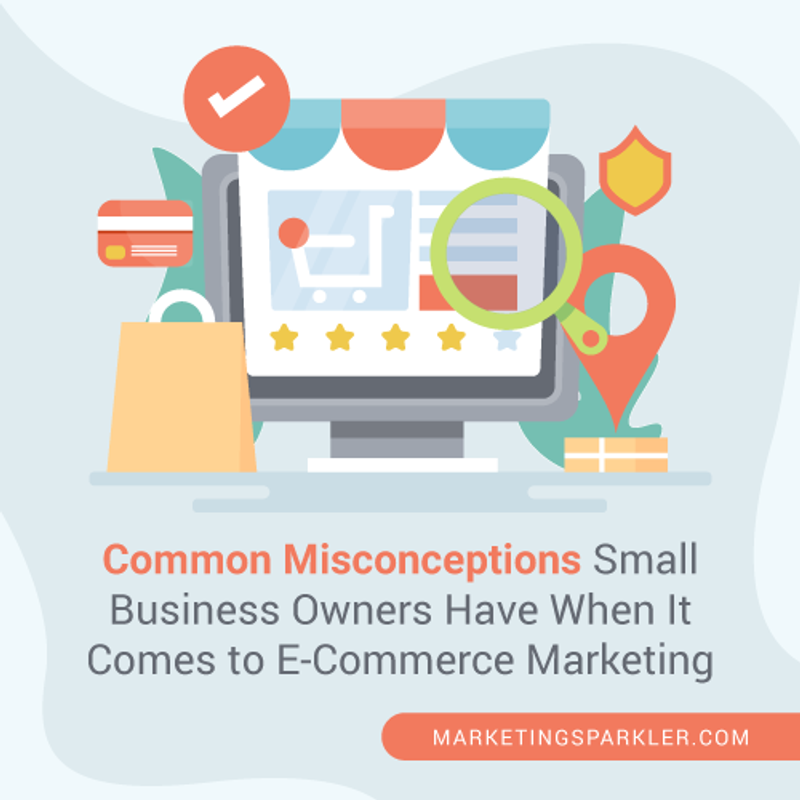E-commerce is growing, and it’s opening up more opportunities than small business owners think. While there is a higher demand for online shopping, numerous challenges, questions and concerns will arise. With that in mind, many business owners will lean toward believing in the common misconceptions about e-commerce marketing.
Let’s debunk a few e-commerce marketing myths to keep your business thriving. It’s not as difficult as people might think.
Common Misconceptions Small Business Owners Have When It Comes to E-Commerce Marketing
Myth #1: Marketing Is Ineffective Because There Are Too Many Businesses to Compete With Online
In 2021, all U.S. e-commerce sales are expected to increase by 13.7% and reach about $908.73 billion. Although retail is a highly competitive industry, your business can succeed through resilience, strategy and agility. Sales will continue to grow as more shoppers make online purchases today.
You may believe that your small business won’t stand a chance. However, there are a few simple ways for you to stay ahead.
1. Analyze the Competition
It always helps your business if you watch your competitors, spot new trends and foresee market shifts. Additionally, you can determine which barriers are within your niche and make more informed decisions.
Once you understand your competition, keep testing your pricing strategy and marketing messages, and assess your website experience for customers.
2. Focus on Providing Quality Customer Experience
Web design should be the first step in quality customer experience. Ensure you optimize your site for reaching the maximum conversions. Once you have a converting website, you’ll have paying customers.
One part of your business that will increase conversions is a speedy checkout process while offering free delivery.
The main reason customers shop online is because of those two factors. When providing quality customer experience, try to offer free shipping. Consider using poly mailers for fulfilling shipments. They are lightweight and durable, improving shipping operations and reducing costs for your business.
3. Stay Unique With Branding
If you want to stand out from the competition, you have to position yourself uniquely. Branding is the core identity of your business. As long as you define your mission and the purpose, you’ll find customers will keep coming back to you for your products.
Ecommerce Marketing Myth #1: Marketing Is Ineffective Because There Are Too Many Businesses to Compete With Online Click To TweetMyth #2: Customers Will Only Buy If I Offer High-Quality Products
Quality products are an essential part of your business. They’re the key to fulfilling and finding your target audience. However, there’s more to it than stocking up on top-notch items. If you build a great website and only list luxury products, you might get crickets as a result.
Instead of focusing on only quality products, you’ll also need to get your name brand out there. This part is where you need a marketing strategy to spread awareness about your company. It will also help you gain trust with potential customers.
Once you create a good marketing strategy and put it to the test, the engaging content on your site and impressive products will do the rest.
Myth #3: E-Commerce Marketing Will Bring Instant Results
Instant marketing results can put a damper on your customer relationships. You want to avoid people making a one-time purchase from your business. It’s more competent to retain buyers because this strategy can boost sales and ensure the survival of your enterprise.
When it comes to e-commerce marketing, your objective is to create a strategy that builds a connection with your audience. This will require time and energy, but it produces results and becomes more effective in the long run.
In the early stages of marketing, you should base your efforts on building up an online presence before directly selling. Customers may never have heard of your business, so placing them in the awareness stage is essential.
Once you understand their problems and the solution, you will create a marketing funnel. This establishes a path for prospects that converts leads into customers.
Consider the further stages of a marketing funnel. This strategy can later convince your prospects they’re ready to purchase products from your e-commerce brand.
Ecomm Myth #3: E-Commerce Marketing Will Bring INSTANT Results Click To TweetMyth #4: Effective E-Commerce Marketing Has to Do With How Much Money I Spend on Advertising
Studies show that organic and paid advertising work equally well for e-commerce marketing. Spending more on advertising alone isn’t all that is required. An effective strategy involves producing lots of content and sending the right message.
When done correctly, marketing and advertising can be easy and cost-effective for your business. Consider which platform works best and how effective your pay-per-click ads are working.
You will still need to build an online presence if you’re advertising. Otherwise, it can cost more money per click than building an online presence. The reason for this is because your competitors decide how much you pay. When a customer searches for products with keywords, websites that rank more appear at the top of the search results.
That’s why it’s practical to focus on SEO while advertising. Even when you want your paid advertising to work, it’s imperative to act on branding awareness alongside these efforts.
Myth #4: Effective E-Commerce Marketing Has to Do With How Much Money I Spend on Advertising Click To TweetAvoid These Myths to Remain Successful
While establishing your e-commerce business, keep in mind there’s always room for improvement. The online retail industry is constantly evolving, and keeping up with new trends and technologies will help your company run more smoothly.
Consider what you can use to establish that strong connection with your prospective customer base. Even when times are busier than ever, be sure to reevaluate your marketing efforts.
Overall, you will probably need to make some slight adjustments. However, a few changes will be more productive in the long term, and the results will likely be successful.
Ciao,
Miss Kemya
This is a guest post from Eleanor Hecks, Editor-in-Chief at Designerly Magazine. Eleanor was the creative director and occasional blog writer at a prominent digital marketing agency before becoming her own boss in 2018. She lives in Philadelphia with her husband and dog, Bear.



